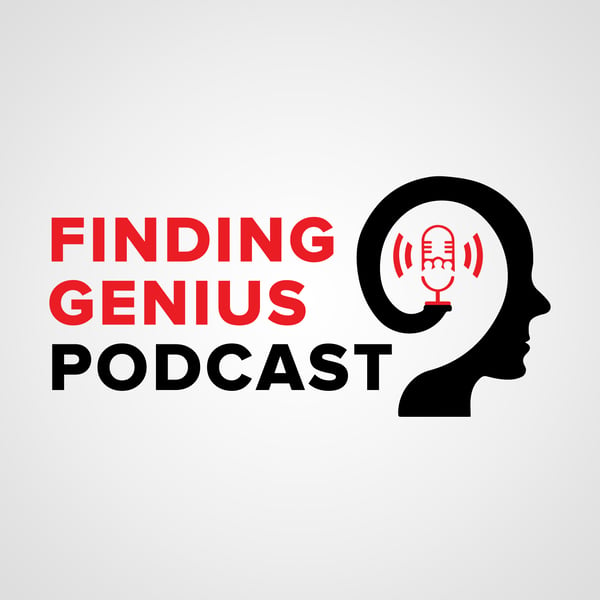Carcinogenic Conditions: James DeGregori Talks Tissue Environment and Cancer Prevention
Finding Genius Podcast
Richard Jacobs
4.4 • 1K Ratings
🗓️ 13 May 2021
⏱️ 36 minutes
🧾️ Download transcript
Summary
Controlling cancer depends on controlling tissue microenvironments, according to researcher James DeGregori. “There's going to be pressure on cells in the lungs of a smoker to adapt to that new environment,” he explains, “and by adapting to it, it can basically favor new phenotypes that could lead to a malignancy that could lead to the initiation of a cancer.”
He and Richard discuss the initiation of cancer and cancer evolution, opening up an exciting path toward prevention.
Listen and learn
- How cancer development stems from our own cells "going rogue" in concert with selective pressures, like carcinogenic conditions, in their tissue environment,
- Why, therefore, random mutations are important in the initiation of cancer, but not enough to explain its growth,
- Why effective prevention of cancer lies with controlling tissue microenvironments, and
- How modulating inflammation affects carcinogenesis pathology and may be key in cancer prevention.
James DeGregori is the Courtenay C. and Lucy Patten Davis Endowed Chair in Lung Cancer Research, which is part of the Department of Biochemistry and Molecular Genetics at the University of Colorado Anschutz Medical Campus.
He explains that genetics, biochemistry, and cell biology work together to prepare the ground for cancer growth. While cancer diagnosis and therapeutics often begin further down the line followed by chemotherapy procedures, researchers like DeGregori are trying to reconfigure the conditions that allow its beginnings.
He says it’s a matter of cells adapting to fit a changing tissue environment; therefore, staving off that change in environment looks to be essential. That means addressing chronic inflammation, inflammation that might come from smoking and lungs failure and other stressors.
But not all inflammation is created equal, and simply preventing it entirely can lead to the inability to fight off infections, for which inflammation is necessary. He adds that "there's two sides to every process, and while too much inflammation is bad, we do need inflammation to fight off infections, to repair our tissues, and other processes."He and colleagues are working on finding that balance as well as identifying which patients could benefit the most.
Listen in for more about how researchers are arresting cancer growth through addressing cell stress, cell aging, and inflammation.
Episode also available on Apple Podcasts: apple.co/30PvU9C
Transcript
Click on a timestamp to play from that location
| 0:00.0 | Forget frequently as questions, common sense, common knowledge, or Google. |
| 0:04.6 | How about advice from a real genius? |
| 0:06.8 | 95% of people in any profession are good enough to be qualified in license. |
| 0:11.2 | 5%? |
| 0:12.0 | Go above and beyond. |
| 0:13.0 | They become very good at what they do, but only 0.1% are real geniuses. |
| 0:18.0 | Richard Jacobs has made his life's mission to find them for you. |
| 0:22.1 | He hunts down and interviews geniuses in every field. |
| 0:24.9 | Sleep science, cancer, stem cells, ketogenic diets, and more. |
| 0:28.5 | Here come the geniuses. |
| 0:30.2 | This is the Finding Genius Podcast. |
| 0:32.8 | The Richard Jacobs. |
| 0:34.4 | Quick note before we begin, the Finding Genius Foundation, as part of the Finding |
| 0:41.4 | Genius Podcast, has recently completed a book about understanding viruses. |
| 0:45.8 | So the creation of this book was to interview 100 virologists, ask them a lot of deep |
| 0:51.2 | difficult questions, take the most difficult questions, and then re-interview the top 25 |
| 0:56.5 | or so, and ask them the hardest questions I could think of. |
| 0:59.6 | And we compile that all into a book. |
| 1:01.4 | So you'll see question and four or five experts answers. |
| 1:04.6 | Question four or five experts answers. |
| 1:06.4 | There's about 30 questions in the book. |
| 1:08.0 | I think it's a great read for the layperson and for the researcher. |
... |
Please login to see the full transcript.
Disclaimer: The podcast and artwork embedded on this page are from Richard Jacobs, and are the property of its owner and not affiliated with or endorsed by Tapesearch.
Generated transcripts are the property of Richard Jacobs and are distributed freely under the Fair Use doctrine. Transcripts generated by Tapesearch are not guaranteed to be accurate.
Copyright © Tapesearch 2025.

